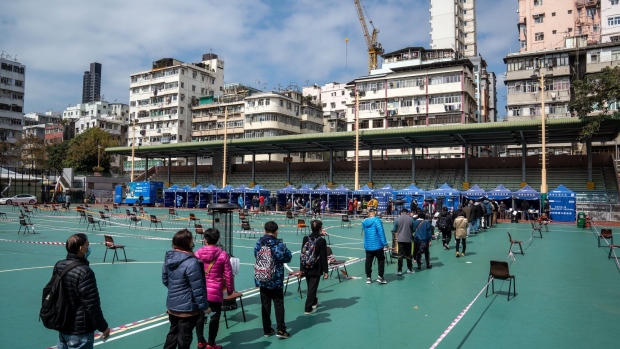Feb 25, 2022
Harsh Covid Rules Prompt 10% of EU Citizens to Exit Hong Kong
, Bloomberg News

(Bloomberg) -- More than 10% of European Union citizens living in Hong Kong have left the city, according to the European Union Office to Hong Kong and Macao, as its strict Covid Zero measures continue to frustrate residents while the rest of the world adjusts to living with the virus.
This exodus happened over the past year or so, Chinese language newspaper Ming Pao reported Friday. The EU office has relayed concerns from expatriates and business community to the Hong Kong government around flight bans and travel restrictions, school closures, extended quarantine in government facilities and separation of children, it said in a statement Thursday.
“We have asked for a dialogue, transparency and an exit strategy as measures affect not only family life but also businesses,” it said, adding that the expatriate exit was triggered by “Covid-related measures and their unpredictability.”
Hong Kong has rapidly spiraled to become one of the worst places to be in the Covid era, according to Bloomberg’s Covid Resilience Ranking in February, as the city battles its worst-ever outbreak. With new daily cases surging past 20,000, the outbreak is overwhelming its health care system. Still, officials have doubled down and further tightened measures, isolating it from the world and jeopardizing its status as an international business hub. Though the policy is in sync with mainland China priorities, it’s out of step with the easing of restrictions around the world.
With more than 1,600 companies, the EU has the largest non-Chinese business community in Hong Kong, the office said. Once seen as one of Asia’s most attractive cities for expatriates, the city has lost its sheen in recent years as it contended with anti-China protests, then the Covid-19 pandemic.
Caught Between
In recent weeks, the Carrie Lam-led administration has imposed restrictions on daily life, closed down schools and imposed some of the strictest travel restrictions in the world.
A total flight ban on nine countries including the U.S., U.K. and Australia has been extended to April 20, while transit travel is also banned for all passengers except those from the mainland and Taiwan.
Meanwhile, the number of residents wanting to flee the city has surged. A net 21,698 people left the city last week, compared with a net inflow of 11,461 in the same week of 2021, government data show. Of those who left, 72% departed through the airport, with the rest leaving via two land crossings with mainland China.
With three rounds of compulsory mass testing planned for the entire city of 7.4 million in March, the exodus may accelerate further.
©2022 Bloomberg L.P.